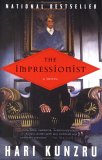Summary | Excerpt | Reading Guide | Reviews | Readalikes | Genres & Themes | Author Bio

The unlucky bridegroom was a very serious young man by the name of Amar Nath, who had recently started practicing Law and was a member of societies for the promotion of hygiene, tradition, cultural purity, cow protection, and correct religious observance. He had recently published an article in The Pioneer on the question of loss of caste through foreign travel, coming down firmly against the notion of leaving Indian soil.
Amar Nath's studies had left him little time to acquire social graces. On first meeting his betrothed he stuttered a few words, then stared at his shoes until the chaperones got bored and called the tea party to a halt. Amrita, of course, said nothing at all, a ghost of a smile playing over her face. She was beautiful, which helped. She gave no immediate sign of insanity. Amar Nath was a dutiful son, and his elderly parents were worried that he showed no interest in anything except books and moral rectitude. So they accepted her uncle's assurances, and pressed their son to do their bidding. The wedding went ahead.
It passed off smoothly. An auspicious hour was determined, and the ceremony duly performed. The priest spoke the mantras correctly and the bride's smile was coy and demure as she was decked with jewelry by the young women of her new family. Sweets were distributed to an improbable number of relatives, and the groom looked more or less dashing as he arrived at the head of the wedding procession. There was, however, one thing of which Anjali strongly disapproved: the sapphire set into the bride's necklace. Sapphires are tricky gems, and though they can deflect Saturn's harmful rays, they can also focus them.
Amar Nath was obviously taken aback by his wife's eagerness in the marriage bed. Anjali, who had joined the household with her mistress, sat up late and listened to his gasps of surprise, little kittenish sounds that carried out of the window and up to the roof where she lay. As she would later remark to the paan vendor, it was a fair bet that this serious boy was not expecting his silent bride to take charge in such a manner. Lucky for her he was so unworldly. Anyone else would have become suspicious. But although rumors of the bride's adventures had already reached as far as the hijras who came to mock the wedding guests, Amar Nath and his family were too lofty to listen to the prattle of eunuchs or servants. With his new wife installed safely in his house, the bridegroom returned to his ruminations about disputed land boundaries and the value of Persian in the education of young gentlemen. So nine months passed, or perhaps a little less, while the young husband attended public meetings, the young wife grew big, and Anjali surrounded herself with a delicious web of speculation and rumor. Then one afternoon, a shriek echoed around the courtyard. Amrita had gone into labor. The baneful influences of the sapphire and the mole started to take effect.
The astrologer was called well before Pran Nath made his entry into the world. The family installed him under a fan on a shady verandah, where he sat drinking sweet tea and clutching his case of charts.
He waited for a very long time.
He finished his tea. He put his case neatly on the table in front of him. He ate some fruit, peeling it carefully with a sharp knife. He declined more tea. He stood up and stretched, feeling his vertebrae click satisfyingly into place. He declined lime soda. The screams of the laboring mother echoed around the garden.
Later the astrologer took a short walk, smelling the jasmine and enjoying the shade of the trees. The gardener was watering a bed of delicate white lilies, and the astrologer stopped to praise him for his work. The mali beamed with pride. Then the two of them fell silent, listening as the gasps and sobs from the mother's apartment became more anguished.
As the sun dipped low over the roofs he was offered a bed on which to relax. He accepted, but found it difficult to doze. Though his business was birth and its meanings, he always found the actual event distressing. The blood and pain. It was a woman's thing, beyond the fathoming of a man, even one educated in the science of Jyotish, to which most common mysteries are transparent. He preferred to think of birth as a mathematical event, the stately progression of planets and constellations through clearly defined houses, gridded sections of airless space. This agony, the scurrying of maids, the scene of mess and horror that was no doubt unfolding in the upstairs room, all of it was most unpleasant. It was not nice to think of the planets tugging so hard at this unfortunate woman's womb. The astrologer always imagined stellar influence as something ethereal, light to the touch.
Reprinted from The Impressionist by Hari Kunzru by permission of Dutton, a member of Penguin Putnam Inc. Copyright © 2002 by Hari Kunzru. All rights reserved. This excerpt, or any parts thereof, may not be reproduced without permission.
Your guide toexceptional books
BookBrowse seeks out and recommends the best in contemporary fiction and nonfiction—books that not only engage and entertain but also deepen our understanding of ourselves and the world around us.